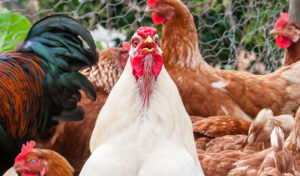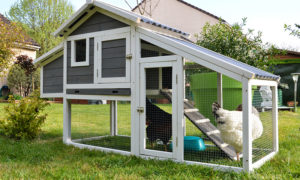While uncommon, some homeowners do raise backyard chickens in HOA communities. But, is this even allowed? What can homeowners associations do about them?
Should Boards Allow Backyard Chickens in HOA Neighborhoods?
If you’ve noticed an increase in backyard chickens as of late, you’re not alone. Backyard chicken ownership has grown more popular in the United States recently, and it’s easy to see why. Chickens are a source of fresh eggs and surprisingly make for great pets, too. Many municipalities have also made it legal to raise backyard chickens even in areas zoned for residential use. But, even if the local government allows it doesn’t mean homeowners are absolutely free to keep backyard chickens.
Homeowners associations are known for their strict rules, even when it comes to pets. If an HOA’s governing documents prohibit chickens, homeowners can’t keep them even if their local government permits them. Today, many governing documents still restrict chickens, also referred to as livestock or poultry.
If your governing documents are silent on the issue, perhaps it is time to consider regulating backyard chickens. But, should you even allow them in the first place?
The Disadvantages of Allowing Backyard Farms in HOA
For the case against backyard chickens in HOA communities, it is important to look at their disadvantages. Chickens are not like cats or dogs, which are the preferred pets in most HOA communities. Here are the cons of allowing backyard chickens in your association.
 1. They Can Make a Lot of Noise
1. They Can Make a Lot of Noise
There is no denying that chickens can be quite noisy. Most associations have nuisance policies that disallow noise up to a certain volume or during certain hours of the day. But, chickens, with their clucking and cackling, can be a source of annoyance for neighbors. Most homeowners also don’t want to keep them indoors, so there is nothing to insulate the sound.
2. Chicken Droppings Are Smelly
It’s no secret that chicken droppings are extremely smelly, giving off a strong ammonia scent. This terrible smell wafting through the neighborhood can irritate and repel residents. Plus, chicken droppings don’t always come in solid form. They can also take on a more liquid-like form. And owners can inconspicuously step on them, dragging them all over the place.
3. They Can Attract Rodents and Other Wildlife
Backyard chickens in HOA communities can bring on a rodent problem. Rodents are attracted to chicken feed, so you might see an increase in these pesky creatures. Apart from rodents, chickens can also attract other wild animals such as coyotes and alligators (in some parts of the country), which are quite dangerous.
4. They Need Chicken Coops
Chickens need coops to live in, but not all chicken coops look great. Some are haphazardly constructed, while others don’t fit with the overall aesthetic of the community. Even if these coops are kept in backyards, they may still be visible from certain angles or streets.
5. The Possibility of Escaped Chickens
If a chicken manages to escape from its coop and run out onto the street, it can create a host of problems. They may run into other people, who might be put off by the chickens. They may also encounter neighbors’ pets and get into nasty fights with them.
Backyard Chicken Coop in HOA: Guidelines to Consider
If your governing documents allow backyard chickens, it’s important to make sure you have the proper guidelines in place to regulate them. Here are some sample guidelines to take into account.
1. Allow Quiet Chickens
To prevent noisy chickens, it may be worth limiting the type of chickens owners can keep. Some of the quieter breeds include Rhode Island red hens, the Wyandotte, and the Orpington chicken. In contrast, don’t allow loud chicken breeds such as Polish hens and Easter Egg hens. Roosters are particularly loud, regardless of their breed, so consider implementing a no-roosters policy, too.
2. Impose a Limit
Just as you would limit the number of dogs or cats owners can keep, you may also want to limit the number of backyard chickens. This will prevent chicken coops from becoming overcrowded. Plus, the more chickens there are, the noisier and smellier they can get.
There is no universal number that works for every community, though. When deciding yours, it is important to examine the size of the lots in your community and how big chicken coops can be. There may also be local ordinances that can apply here.
3. Regulate Chicken Coop Design
 Homeowners associations typically regulate architectural changes, making sure owners abide by the architectural standards when making additions or alterations to their home exteriors. Similarly, your board may also want to regulate the design of chicken coops that owners build.
Homeowners associations typically regulate architectural changes, making sure owners abide by the architectural standards when making additions or alterations to their home exteriors. Similarly, your board may also want to regulate the design of chicken coops that owners build.
You can also have owners fill out an application, submit plans for the coop, and any additional documents or photographs of the design they have in mind. While exact guidelines for this can vary from one HOA to another, the most common one is to have the coop’s design match the rest of the community.
4. Outline Homeowner Responsibility
Finally, your backyard chicken rules should indicate the responsibilities that owners have. Waste management is one of the top things you should tackle. How should owners dispose of droppings and other waste? Perhaps there are local ordinances that discuss this topic as well.
Another responsibility is to have owners keep chickens in their coops at all times. If they must release them from the coop for whatever reason, keep them under close supervision to make sure they don’t escape into the streets or other homes. If your association allows fences, consider having the owners install a perimeter fence to keep the chickens from running away. Remember that chickens can fly short distances, so make sure to have tall fences, too.
The Decision Is Yours
When it comes to backyard chickens in HOA communities, the question of whether or not to allow them ultimately depends on the association. The governing documents can shed some light on the issue and typically hold control even if local ordinances permit them.
Managing a homeowners association is not always an easy task. Give your board the help it needs by hiring an HOA management company like Clark Simson Miller. Give us a call today at 865.315.7505 or contact us online for more information.
RELATED ARTICLES:
- Can Assistance Animals In HOA Communities Be Restricted?
- HOA Architectural Review Committee: Who Are They?
- Who Are The Section 8 Tenants? Should You Have Them In Your HOA?

